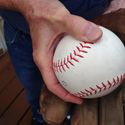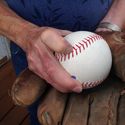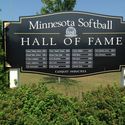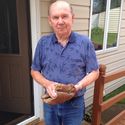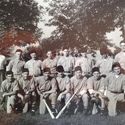On Sports: Anderson is an old-school champion
Scanlon's Anderson is a diamond legend
August 30, 2019
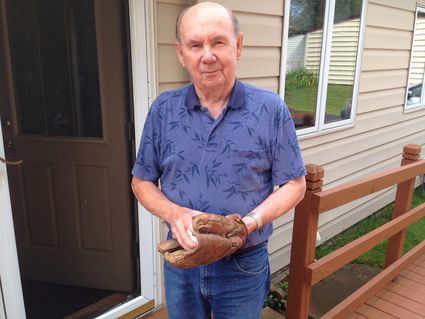
Steve Korby
Larry Anderson, outside his Scanlon home with his Herb Score-autographed Rawlings glove. Score pitched for the Cleveland Indians in the 1950s.
Many young athletes today grow up dreaming of college scholarships and careers in professional sports, but there was a time that being a good men's softball pitcher could help a guy get a better job ... as long as he promised to play on the company team.
I recently spoke with one of my former neighbors, Larry Anderson, who has lived near where I grew up in Scanlon on Sahlman Avenue since 1960.
His storybook sports history aamazes me. From all of my years of working in human resources, I was trained to not rely on personality stereotypes. But Anderson definitely fits the accountant mold. He was educated and worked as an accountant, is quiet and unassuming, organized, practical, clever and smart, and yet very humble.
Larry Anderson originally hails from West Duluth. His real first name is George but that is his dad's name, so ever since he was a young man he has gone by "Larry." He played baseball and softball at Wheeler Park and other playgrounds in the west end of town.
His dad, whose nickname was "Hots" because he loved hot dogs, is in the state halls of fame for bowling, softball, and horseshoes.
Anderson's high school baseball team at Duluth Denfeld won the state title in 1950. Larry was the main pitcher. They won all three tournament games by one run. Until this year, Denfeld was the last Duluth area team to win a baseball championship - a span of 69 years.
Larry showed me all the newspaper clippings from those days in a scrapbook his father had made for him. His father was very organized.
After high school, under his father's tutelage and coaching, Anderson started playing organized fastpitch softball, playing mostly as a pitcher. Bob Marmon, who was a fireballing West Duluth pitcher at the time, showed him various rise- and drop ball pitch grips. When asked if it was difficult to switch from overhand to underhand throwing, he said no, he adapted readily. Shortly thereafter, Anderson was drafted into the military and stationed in Germany. There he pitched for both softball and baseball military teams.
When he returned home to Minnesota, he attended UMD and eventually received his accounting degree.
But Anderson's pitching prowess was becoming more impressive. In 1954, the team he played for - North Pole Bar of Duluth - won the state tourney in Cloquet. Leonard Himango, the manager at Benkoski and Holmes Construction in Cloquet, offered him a summer job the following years during college if Anderson pitched for them.
Anderson said the Cloquet league had only four teams back then - Benkoski and Holmes, Diamond Brands, Northwest Paper and Wood Conversion. It was a highly skilled and competitive league, he said. In 1957, Benkoski and Holmes finished last in the Cloquet League but won the city playoffs and then state.
"We got hot at the right time," Anderson said.
And the recruiting offers kept coming. Al Spafford, manager at the Wood Conversion plant, said there would be a job for him when he received his accounting degree the next year ... and, of course, if he pitched for the company.
His work and softball career continued to flourish.
He was employed by Wood Conversion and later Conwed from 1958 to 1985. Anderson, and another pitcher named Chuck Lindquist, made the team almost unbeatable. Of course, they had great hitters and defense, but it was the pitching that made those teams superior.
League rules were that players either had to live in Cloquet or work for one of the companies. Wood Conversion won the state tournament in 1958, 1959 and 1960. Anderson said there were rumors that the company gave jobs and even bought houses for some of their tremendous talent. It was only partially true.
In 1962, Anderson was on the same team as Bo Bo Johnson and Chuck Lindquist: all three pitchers are in the Minnesota State Softball Hall of Fame. It was yet another time when Anderson's team won the state tourney. Cloquet went 4-0 and the opposition did not score a run in the tournament.
In a span of six years, Larry Anderson was on five softball state championship teams.
Anderson often got asked to play for other teams on weekends and they would reimburse his expenses. He said the Sammy's Pizza owner asked him to pitch in an exhibition in Canada. It was only one game and he was striking out Canadians left and right. Anderson offered that it was the first time a kid came out of the crowd and asked for his autograph. Out of curiosity, he and some teammates measured how far the pitching rubber was from home plate. It was about five feet closer than the distance in Minnesota ... no wonder he seemed so fast. He also helped the Victory Bar and Frankie's Bar teams win tournaments in Wisconsin.
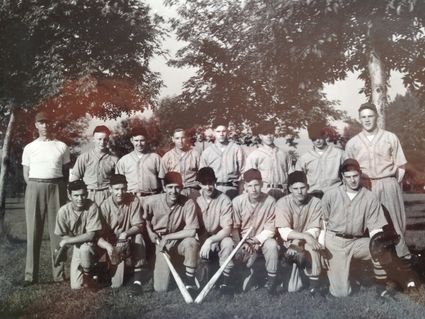
Contributed photo
Duluth Denfeld 1950 Minnesota baseball champs. A young Larry Anderson is third from left, in the top row.
Because of cramps in his pitching hand, Anderson had to quit pitching and softball in 1963. It was the same time the Cloquet league disbanded.
Fortunately, his other passion is bowling. He bowled for more than 50 years until Southgate Bowl closed in Cloquet. For many years, he was president of the Duluth Area Bowling Association.
So, like his dad, Hots, Larry Anderson is enshrined in the softball and bowling halls of fame. At 87, it's not surprising that he has a hip and elbow that gives him a little grief.
He told me that Softball Hall of Famer Rudy Senich once grabbed Larry's hand and said "It's amazing how much pitching 'stuff' is in this hand."
Steve Korby's interest in writing goes back to when he was in fourth grade and editor of the Scan-Satellite school newspaper
in Scanlon.


